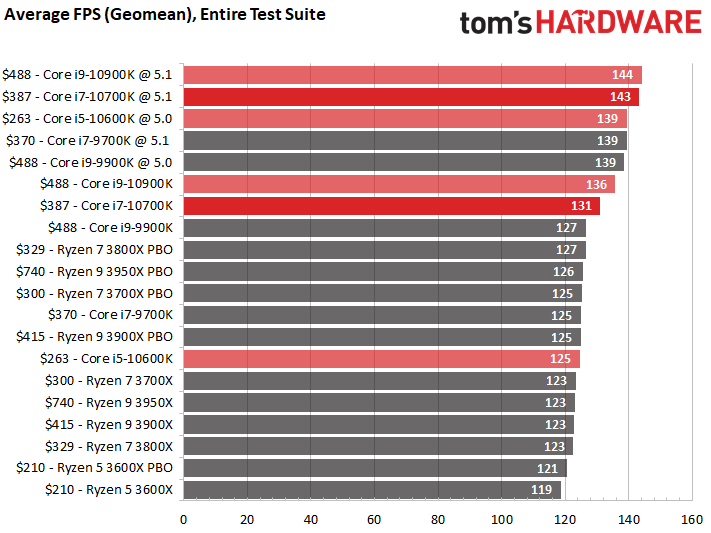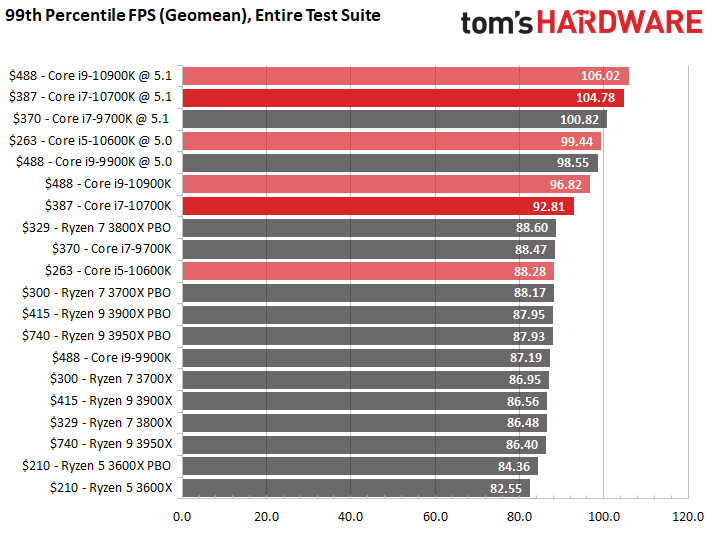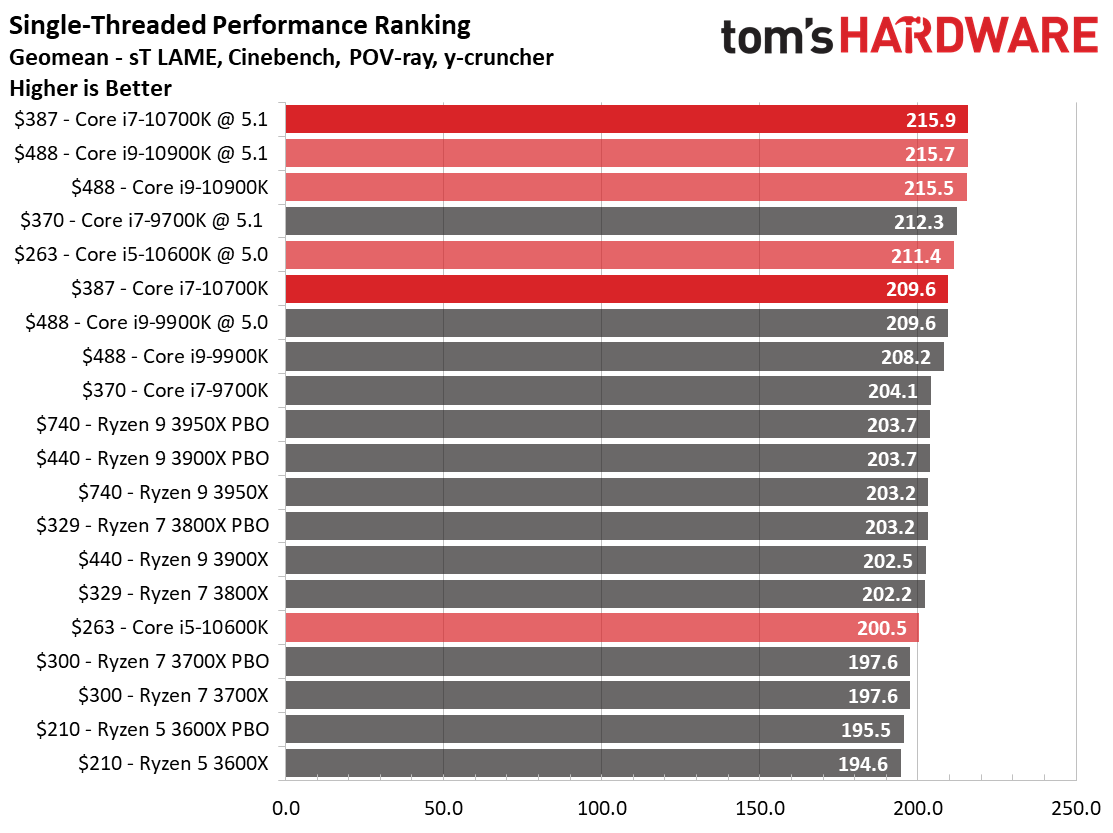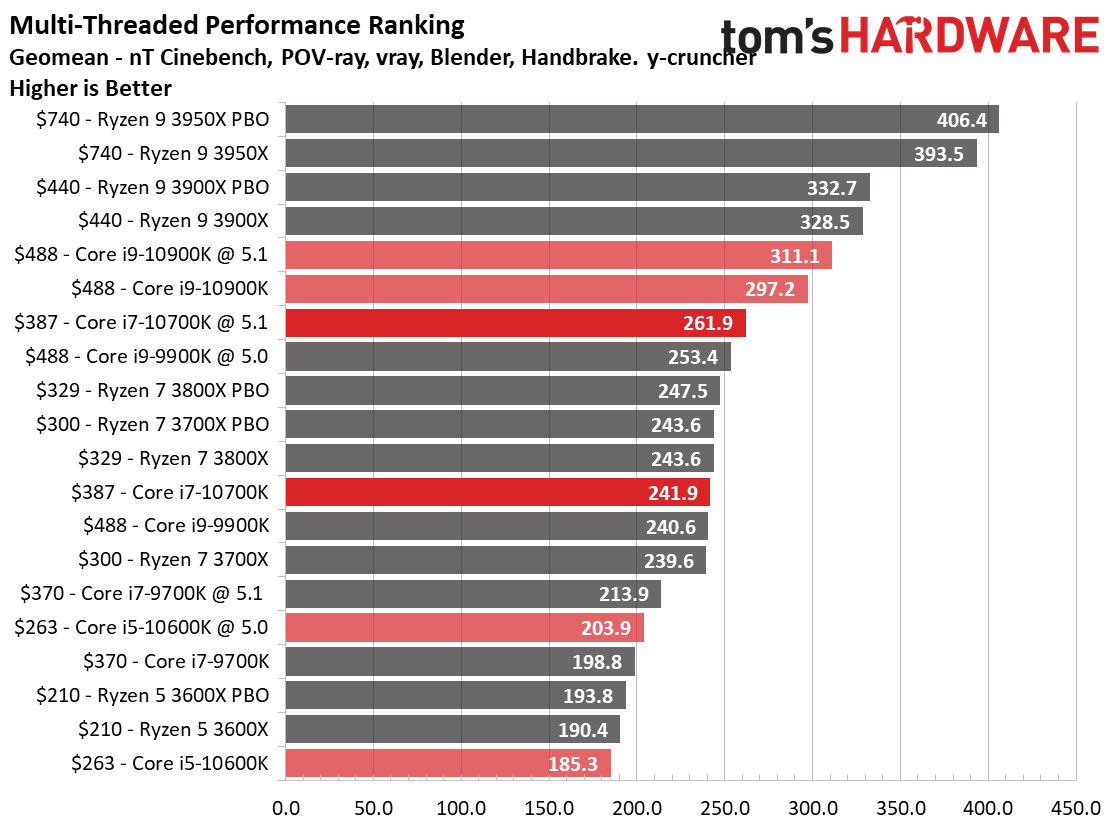Why you can trust Tom's Hardware
The $387 (MSRP, current street price higher) Core i7-10700K offers more performance than the previous-gen Core i9-9900K, and it comes at a significant gen-on-gen price reduction of $114 that's useful for other additives, like a better GPU, motherboard, or SSD. The Core i7-10700K also provides shockingly-good performance in gaming, particularly after overclocking, which takes some of the shine off the $488 (MSRP) Core i9-10900K.
On the surface, the 10700K looks like the go-to chip for enthusiasts chasing the best gaming performance possible within a limited budget, but AMD's reduced pricing, not to mention Intel's own competition from the Core i5-10600K, muddies the waters.
In the chart below, we plot gaming performance using average frame rates and a geometric mean of the 99th percentile frame times (a good indicator of smoothness), which we then convert into a frames-per-second measurement. Bear in mind that we tested with an Nvidia GeForce RTX 2080 Ti at 1920x1080 to alleviate graphics-imposed bottlenecks. Differences between our test subjects shrink at higher resolutions.




At stock settings, the Core i7-10700K is roughly 5% faster than the Core i5-10600K in our test suite, and that delta shrinks to 3% after overclocking. That slim lead comes at a $124 (32%) premium, though, which isn't worth it for all but the performance-obsessed.
Conversely, the 10700K only trails the 10900K by 4% at stock settings and less than 1% after overclocking, taking the shine off the 10900K's leading gaming performance. If you're focused on gaming, those slim deltas don't justify the 10900K's $101 premium, but the 10900K's extra two cores do come in handy for productivity applications.
The Ryzen 7 3700X offers the best mix of price and gaming performance in this bracket, but it trails the 10700K by 6% at stock settings and 14% after overclocking. That means you won't have as much room to grow on the gaming front as newer, faster GPUs come to market. You'll have to buy your own cooler for the 10700K, but the Ryzen 7 3700X comes with a bundled cooler and costs $87 less, so it's a worthy lower-cost alternative if you're not after bleeding-edge gaming performance.
The 3900X offers essentially the same level of gaming performance as the Ryzen 7 3700X, so, if you choose to go with an AMD processor, the latter is the better bang-for-your-buck choice for gaming-focused builds.
Get Tom's Hardware's best news and in-depth reviews, straight to your inbox.
The Ryzen 9 3900X offers 35% more performance than the stock 10700K in threaded productivity applications and slots in at a solid $415 price point. The 3900X was still 27% faster even after we tapped into the 10700K's overclocking potential, making it a no-brainer for productivity work. The Ryzen 9 3900X also comes with a bundled cooler that's fine for stock operation, which improves the value proposition over the Core i7-10700K for threaded productivity work.
The Core i7-10700K is a stellar overclocker that yields big performance gains with reasonable conventional cooling solutions, like high-end air coolers or mid-range AIOs. In contrast, the Core i9-10900K essentially comes overclocked out of the box, so performance gains are slim. It also sucks a prodigious amount of power, thus requiring expensive cooling solutions.
Overall, the Intel Core i5-10600K is the best value for gaming-focused builds, while the Ryzen 9 3900X is obviously the best choice for threaded productivity work. Conversely, the 10700K is a far better value for gamers than the 10900K, particularly if they're not afraid to overclock and therefore gain access to essentially the same level of gaming performance.
AMD has left a pricing gap in its Ryzen 3000 series that it will fill soon with the Ryzen 7 3800XT, but despite that pricing advantage, the Core i7-10700K appeals to a limited cross-section of users. If you're primarily interested in gaming and overclocking is on the menu, the Core i7-10700K offers the best performance in its price range and leaves more room in the budget than the Core i9-10900K. For productivity work, the Ryzen 9 3900X is a far better deal, though, and it's no slouch on gaming, either, making it the better all-around CPU.
MORE: Best CPUs
MORE: Intel and AMD Processor Hierarchy
MORE: All CPUs Content
Current page: Conclusion
Prev Page Core i7-10700K Adobe Premiere, Photoshop and After Effects Performance
Paul Alcorn is the Editor-in-Chief for Tom's Hardware US. He also writes news and reviews on CPUs, storage, and enterprise hardware.
-
jgraham11 Wow that's high power consumption! Good thing you are running liquid cooling! Compare that to the AMD 3700X at half the power!Reply
Look at the shorter tests, the Intel systems seems to do better until their turbo runs out. AMD seems to do better with anything that takes more time.
I realize that both AMD and Intel systems are overclocked but the AMD systems seem to do better with memory tuning, maybe instead of just using PBO (a one click solution), take the same time you use for the Intel processors and put that into the memory. AMD would show even better in games and anything that was memory intensive.
1440p gaming would be more relevant! I do realize it doesn't make for good looking graphs but 1080p is not the typical use case for this CPU and comparable GPU.
Good review overall. Pretty fair way of presenting the information. Good memory choices. Efficiency focus was great to see.
Way better than the typical casting AMD CPUs in bad light, for example where Toms put the 3400G ($159) against the Intel 9700k($379.00). -
RodroX Good review, too bad at this price point you only show 1920x1080p game results.Reply
I understand thats the only way to keep GPU from been a "bottleneck", but if I was to spend this much money I would aim for playing at 1440p High details.
I still think that no matter what you wana play, the resolution and/or refresh rate, at this point in time the best bang for the buck for ultrafast FPS is the Core i5 10600K + high speed memory, and you feel like it some quick brainless overclocking.
Other than that just pick the Ryzen your wallet can buy and be happy. -
DrDrLc Look... Can we actually get gaming benchmarks with modern games and at higher resolutions?Reply
Intel keeps on saying that they are better for gaming because of single-threaded 1080p benchmarks, but we don't game like that with 2080ti cards. We don't build $2000 machines with one of the most expensive gaming cards to run 1080p ffs.
Are you going to give us next gen graphics card benchmarks only at 1080p?
If not, can we actually see what this new CPU will look like in comparison to others at resolutions that we use? We've been watching all the review sites doing this for three or four years now... It's Intel's marketing strategy, and you are letting them do it, and playing along! It's a problem, because we don't have any reviews that actually show us what to buy for the way that we actually play games. These are reviews are actually useless for gamers. -
barryv88 I find it downright shocking to see that popular hardware review sites such as Tom's are still harping so much on HD gaming results.Reply
Yes, game results at HD are less GPU bound, but it only paints Intel in a good picture while hiding a rather shocking truth - that AMD is incredibly gaming competitive at the world's sweet spot for gaming resolutions. Q H D. (Typically 2560x1440).Tom's explicitly stated in the past that QHD is the best area for gaming given that screens today with G/Fsync/144hz+ options cost less than $500 and are very affordable in general, today. 4K is still too high for most GPU's to handle, meaning that QHD fills a good middle ground at the end of the day, beating HD at higher image quality.
Really Tom's, get your act straight. It's time to nudge your audience towards higher gaming echelons.
Start publishing QHD CPU results in addition as this will entice people to make the switch towards higher res gaming but also this - AMD Ryzen CPU's in general are less than 5% slower than Intel chips at QHD or 4K FPS. Intel is therefore NOT the indisputable king as no god given person can tell such a small difference in high res FPS. Enough with the gaming myths! Ryzen CPU's tend to pack more cores that actually makes them far more future prove. If most of those cores sit idle in today's gaming, who cares? Wouldn't you rather have enough cores in reserve for more future demanding games and enjoy streaming/recording quality with extra muscle under the hood to enjoy less stutter? Call me stupid, but to me this actually makes Ryzen a better gaming choice.
Your article adds to this whole HD stagnation thing that's been going on for over 10 years. Over 90% of steam players still game at HD. It's time to give em reason to make the next push - QHD and then 4K.
Make a start. I challenge Paul Alcorn to do a "world sweet spot QHD CPU FPS" article. Get around 10 people or so to game on both Intel and AMD machines. Gather the results and lets see if Intel still holds the crown. -
Drunk Canuck The only downside is how hot the 10700K gets. When I got mine, I ran a stress test at stock and it hit 74 degrees with a Fractal Celsius S24 AIO with my case open (Define R6) for maximum airflow and all fans running. It gets into the mid 80's when the case is closed. I'd assume I'd get those temperatures with the case open when overclocking and that's a bit much.Reply
I will say this though, my new system runs Doom Eternal really well. Basically everything cranked to high or ultra at 2K resolution with a GTX 1070. -
milleron This year, many will be building new computers mostly dedicated to Microsoft Flight Simulator 2020. In the past, flight sims were more likely to be CPU-bound than GPU-bound, but it's not clear that that's any longer the case. Is there any way to predict before final release of this much-anticipated game whether it will benefit more from single-core clock speed or multi-threading? Would anyone hazard a guess on whether to plan an Intel or Ryzen build?Reply -
RodroX Replymilleron said:This year, many will be building new computers mostly dedicated to Microsoft Flight Simulator 2020. In the past, flight sims were more likely to be CPU-bound than GPU-bound, but it's not clear that that's any longer the case. Is there any way to predict before final release of this much-anticipated game whether it will benefit more from single-core clock speed or multi-threading? Would anyone hazard a guess on whether to plan an Intel or Ryzen build?
You should wait for reviews when its launched.
Other than that this is the best you can check right now: https://www.pcgamer.com/microsoft-flight-simulator-system-requirements/
Im guessing any Ryzen 5/7 3xxx will play nice, probably thye Ryzen 7 3700X could be a cheaper, yet very good option vs the i7 10700K.
And if rumors becomes true the new Ryzen 4xxx could be a new jewel for gaming. But that wont be out till atleast the end of september. -
st379 There are still 1080p 240hz monitors that are being sold.Reply
1080p ultra is very realistic, Paul did not test it at 1080p low he tested it on max settings.
It is not like some review sites that test at 720p low or even worse at 480p.
This is a cpu review not a gpu.
In gpu review I would expect it to be tested in 1080p up to 4k, maybe even 8k. -
RodroX Replyst379 said:There are still 1080p 240hz monitors that are being sold.
1080p ultra is very realistic, Paul did not test it at 1080p low he tested it on max settings.
It is not like some review sites that test at 720p low or even worse at 480p.
This is a cpu review not a gpu.
In gpu review I would expect it to be tested in 1080p up to 4k, maybe even 8k.
True, but it does not change the fact that there are also more and more 1440p monitors sold everyday. And when you spend this amount of money for a CPU many people will also consider a high end GPU with a 1440p monitor for gaming, thus it will be very nice to have those results. -
barryv88 Reply
DX12 should remove alot of CPU bottleneck and hopefully we'll see great core scaling if all pans out for the engine. I for one would like to see how the engine handles scenery draw and how smooth everything will translate to FPS.milleron said:This year, many will be building new computers mostly dedicated to Microsoft Flight Simulator 2020. In the past, flight sims were more likely to be CPU-bound than GPU-bound, but it's not clear that that's any longer the case. Is there any way to predict before final release of this much-anticipated game whether it will benefit more from single-core clock speed or multi-threading? Would anyone hazard a guess on whether to plan an Intel or Ryzen build?